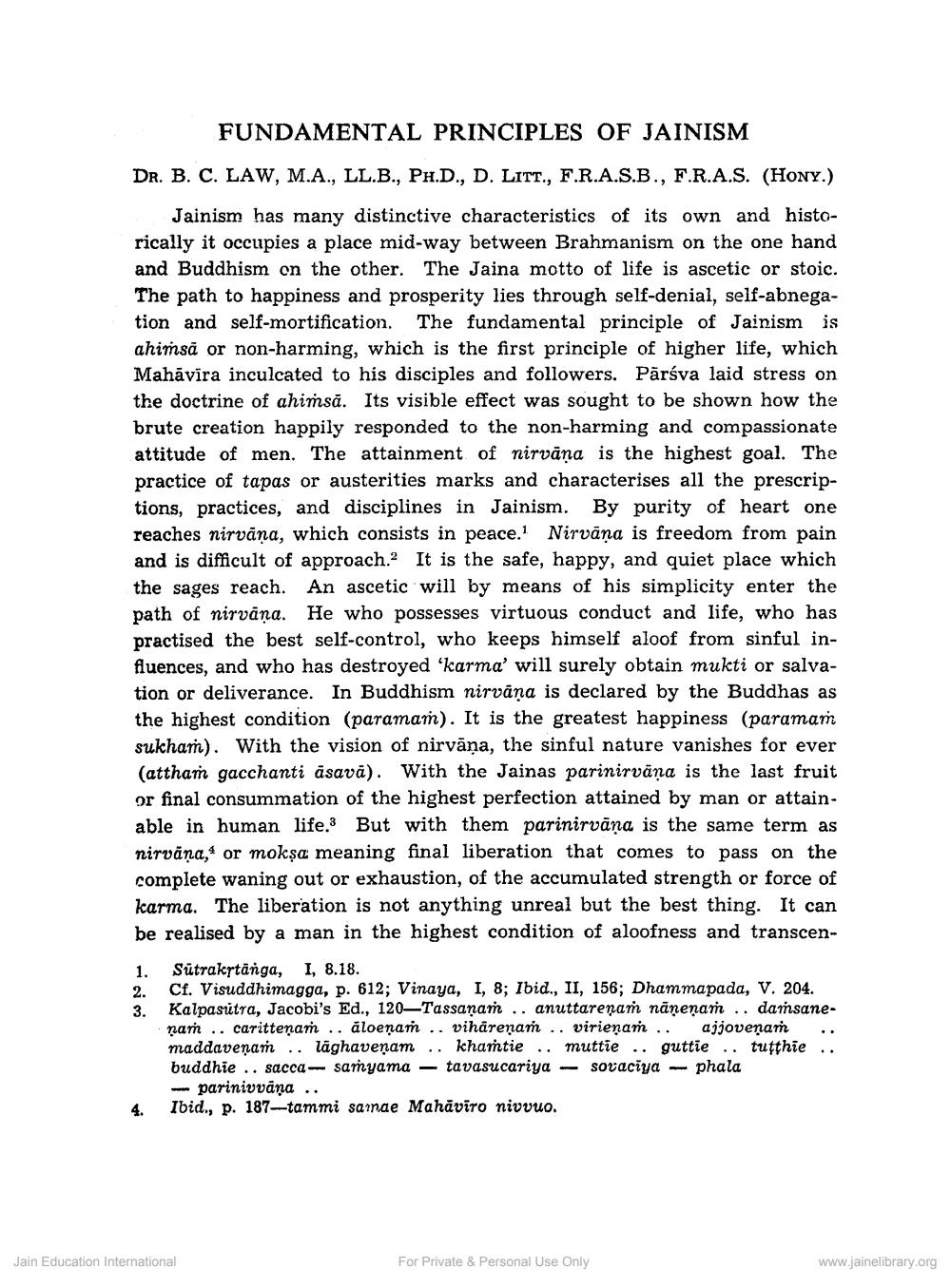Book Title: Fundamental Principles of Jainism Author(s): B C Law Publisher: Z_Vijay_Vallabh_suri_Smarak_Granth_012060.pdf View full book textPage 1
________________ FUNDAMENTAL PRINCIPLES OF JAINISM DR. B. C. LAW, M.A., LL.B., Ph.D., D. LITT., F.R.A.S.B., F.R.A.S. (HONY.) Jainism has many distinctive characteristics of its own and historically it occupies a place mid-way between Brahmanism on the one hand and Buddhism on the other. The Jaina motto of life is ascetic or stoic. The path to happiness and prosperity lies through self-denial, self-abnegation and self-mortification. The fundamental principle of Jainism is ahimsă or non-harming, which is the first principle of higher life, which Mahāvīra inculcated to his disciples and followers. Pārsva laid stress on the doctrine of ahińsă. Its visible effect was sought to be shown how the brute creation happily responded to the non-harming and compassionate attitude of men. The attainment of nirvana is the highest goal. The practice of tapas or austerities marks and characterises all the prescriptions, practices, and disciplines in Jainism. By purity of heart one reaches nirvana, which consists in peace. Nirvana is freedom from pain and is difficult of approach. It is the safe, happy, and quiet place which the sages reach. An ascetic will by means of his simplicity enter the path of nirvana. He who possesses virtuous conduct and life, who has practised the best self-control, who keeps himself aloof from sinful influences, and who has destroyed 'karma' will surely obtain mukti or salvation or deliverance. In Buddhism nirvana is declared by the Buddhas as the highest condition (paramam). It is the greatest happiness (paraman sukham). With the vision of nirvāņa, the sinful nature vanishes for ever (attham gacchanti āsavā). With the Jainas parinirvāna is the last fruit or final consummation of the highest perfection attained by man or attain. able in human life. But with them parinirvana is the same term as nirvana,* or mokṣa meaning final liberation that comes to pass on the complete waning out or exhaustion, of the accumulated strength or force of karma. The liberation is not anything unreal but the best thing. It can be realised by a man in the highest condition of aloofness and transcen1. Sūtrakstānga, I, 8.18. 2. Cf. Visuddhimagga, p. 612; Vinaya, I, 8; Ibid., II, 156; Dhammapada, V. 204. 3. Kalpasitra, Jacobi's Ed., 120—Tassanam .. anuttarenam nanenam.. damsane nam .. carittenań .. aloeņañ .. vihārenań .. virienam.. ajjovenam maddavenan .. lāghaveņam .. khartie .. muttie .. guttie .. tutthie .. buddhie .. sacca-- samyama - tavasucariya - sovaciya - phala parinivvana .. Ibid., p. 187--tammi sarnae Mahāviro nivvuo. Jain Education International For Private & Personal Use Only www.jainelibrary.orgPage Navigation
1 2 3 4 5 6 7 8 9 10 11 12 ... 35
